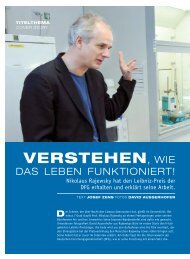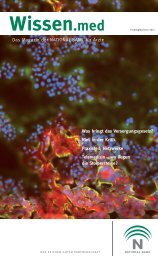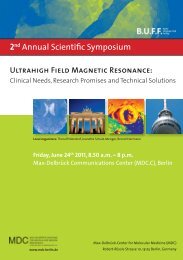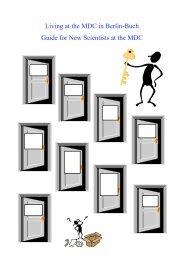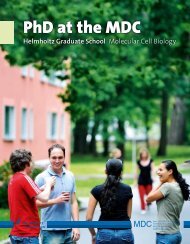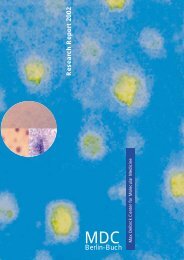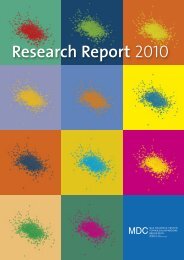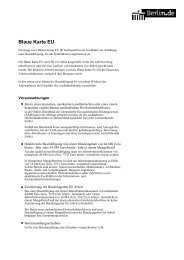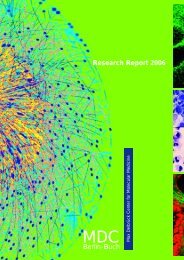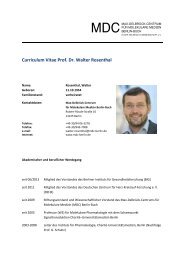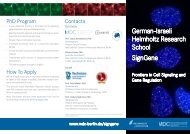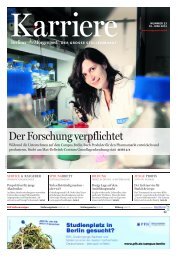BIMSB Brochure - MDC
BIMSB Brochure - MDC
BIMSB Brochure - MDC
You also want an ePaper? Increase the reach of your titles
YUMPU automatically turns print PDFs into web optimized ePapers that Google loves.
PhD Program,partners &activitiesGroup LEADERs<strong>BIMSB</strong> group leaders are international scientists, recognized leaders in their field and experts in high-end technologies.Partners within the <strong>MDC</strong> are ...Norbert Hübner, Medical genomics of complex cardiovascular diseasesMatthias Selbach, Cell signalling and mass spectrometryErich Wanker, Molecular mechanisms of neurodegenerative diseasesJana Wolf, Mathematical modeling of cellular systems and others... and many othersSystems Biologyat the <strong>MDC</strong>The Berlin Institute for Medical Systems Biologyat the Max Delbrück Center for Molecular Medicine Berlin-BuchAs a core activity, <strong>BIMSB</strong> has established an international PhD exchange programbetween the <strong>MDC</strong> and New York University (NYU) to educate the next generationof systems biologists. Both institutions have a strong reputation in systems biology,research and training, and a portfolio of complementary expertise. Students are allowed tospend half of their time at either location to work on collaborative projects, co-supervised byscientists from each institute.Wei ChenNovel sequencingtechnology, miRNAregulation and humanmolecular geneticsMarina ChekulaevaNon-coding RNAsand mechanisms ofcytoplasmic generegulationNikolaus RajewskySystems biology ofgene regulatoryelementsCommunication and conferences such as theannual Berlin Summer Meeting contribute to aworldwide scientific exchange and network. <strong>BIMSB</strong>also organizes lectures and summer schools forinterdisciplinary systems biology education.Berlin Summer Meeting www.berlinsummermeeting.orgWith respect to interdisciplinary research and training, <strong>BIMSB</strong> integrates major activitiesinto the Humboldt University’s Excellence Initiative grant to develop an Integrative ResearchInstitute for Life Sciences for <strong>MDC</strong>, HU and Charité.<strong>BIMSB</strong> researchers collaborate world-wide with research institutions in China, Israel, Japan,the US and many European countries.Stefan KempaIntegrativemetabolomics andproteomicsMarkus LandthalerRNA biology andpost-transcriptionalregulationAlexander LöwerSignaling dynamicsin single cellsBaris TursunGene regulation andcell fate decision inC. elegansContact BIMSbNikolaus Rajewsky, Head of the Berlin Institutefor Medical Systems Biology at the <strong>MDC</strong>Jutta Steinkötter, <strong>BIMSB</strong> ManagementNadine Ewald, Administrative AssistantPhone 49 (0) 30 9406 3034Email nadine.ewald@mdc-berlin.deAddress Robert-Rössle-Str. 10, 13125 Berlin, GermanyUwe OhlerComputationalregulatory genomicsAna PomboEpigenetic regulationand chromatinarchitectureRobert ZinzenSystems biology of neuraltissue differentiationJennifer Stewart, Graduate AdministrationInternetwww.mdc-berlin.de/en/bimsb
transcription factorsco- factors, chromatin…<strong>BIMSB</strong>@<strong>MDC</strong>The Berlin Institute for Medical Systems Biology (<strong>BIMSB</strong>) is the Systems Biology program of the Max Delbrück Centerfor Molecular Medicine (<strong>MDC</strong>). Launched in 2008 with start-up grants from the BMBF and the Senate of Berlin,<strong>BIMSB</strong> now receives <strong>MDC</strong> institutional funding.<strong>BIMSB</strong> is focused on the genome’s post-transcriptional regulatory code and its impact on molecular mechanisms. Thisarea lies at the heart of today’s biological and biomedical research on health and disease. <strong>BIMSB</strong> integrates experimental,computational and high-end technological innovations with the central themes of <strong>MDC</strong> research: cardiovascular andmetabolic diseases, cancer, and diseases of the nervous system.Medical systems biology research requires a critical mass of disciplines, technologies, experts and collaborations in closeproximity, and with easy access, to a wide range of collaborators. The construction of a new building for <strong>BIMSB</strong> will make itthe <strong>MDC</strong>’s first institutional expansion into the center of Berlin, supporting even closer interactions with major academicand medical institutions in the city and region. Current collaboration partners include Charité, Humboldt University, FreeUniversity Berlin, Max Planck as well as Leibniz Institutes in Berlin and beyond.CAP5‘UTRenhancers/promoterproteinnucleuscytoplasmribosomecatalytic functions, metabolic and structuralcomponents, signal transduction & regulationof gene expressionphenotype in development, physiology,health and diseasePre-mRNAmature mRNAcodingtranscriptioncapping, splicing & 3’end processingtransport3‘UTRmicroRNAs + RNA-binding proteinsregulation of mRNA transportlocalization, turnover and proteinsynthesisAAAAAAAAAAAAAATECHNOLOGIES& METHODSIN CONSTRUCTIONThe new location of <strong>BIMSB</strong> will be integrated in the historical campus of the Humboldt University and the new Life scienceCampus, in close proximity to the Charité University hospital and additional research institutes. This environment will alloweven closer interaction to various disciplines such as biophysics, theoretical biology, bioinformatics, mathematics, molecularmedicine as well as basic molecular biology. Collaborations will span the scientific areas of infection biology and immunology,neurosciences, development, cancer, regenerative therapies as well as genomics of complex and rare diseases.The new building of 5500 square meters will accommodate 25 experimental and theoretical groups, technology platforms andconference facilities. It will be designed to support interdisciplinary research, state-of-the-art technologies and communication.SCIENTIFIC MISSIONThe grand challenge and overall scientific <strong>BIMSB</strong> mission is to decipher the ‘post-transcriptional regulatory code’ andto directly integrate it with major cellular regulatory mechanisms including epigenetics, transcription, and signaltransduction. <strong>BIMSB</strong> researchers apply quantitative experimental and theoretical approaches to model systems suitablefor multi-level high-throughput analyses. Thus, Drosophila, nematodes, zebra fish, yeast, and mammalian cell culture systemsare instrumental to the <strong>BIMSB</strong> mission. <strong>BIMSB</strong> groups perform research in basic cell biology, development, regeneration, stemcell biology, metabolism, genetic variability as well as global health questions including cancer, metabolic, cardiovascular andneurological diseases.<strong>BIMSB</strong> combines high-throughput technologies, scientific expertise in proteome and metabolome analysis andbioinformatics in a set-up that is unique in Germany. These resources are complemented by <strong>MDC</strong> infrastructures.<strong>BIMSB</strong> Technology Platforms currently comprise newest Illumina Sequencing technology as well as a Single MoleculeReal Time Platform (Pacific Biosciences), Roche and life technology systems. Mass spectrometry is represented with highcapacities for quantitative proteome and metabolome analysis. Data are processed, analyzed and integrated with state-ofthe-artcomputer cluster and database set-ups to support functional analysis and mathematical modeling of quantitative anddynamics. Capacities and areas of technologies are expected to expand with the recruitment of more groups.The unique potential of <strong>BIMSB</strong> is not only the combination of high-end technologies but also the expertise andcombination of sophisticated methodologies such as PAR-CLIP (photoactivatable-ribonucleoside-enhanced-crosslinking andimmunoprecipitation), eFACS (fluorescence-activated cell sorting of embryos), SILAC and pulsed SILAC (stable isotope labeling byamino acids in culture cells), single cell imaging with established molecular technologies and mathematical models. Data fromthe various biological and experimental systems are integrated into the <strong>BIMSB</strong> database doRiNA, dorina.mdc-berlin.de.



